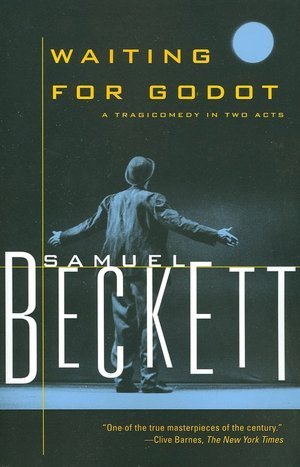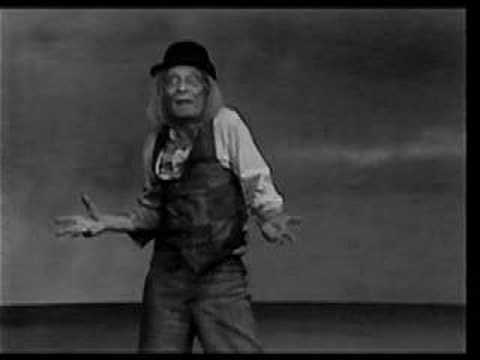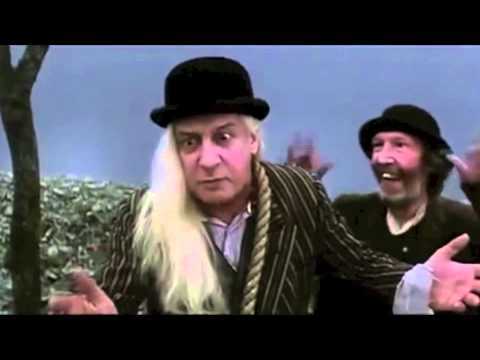Lucky's Monologue: A Statement Control and Futility
It is generally accepted that Waiting For Godot is a tragic comedy—a show that, beneath a layer of lightheartedness, delves into the futility of human life. The fascinating aspect of Waiting For Godot, however, is how it treats the genres of tragedy and comedy as spectrums; different performances undertake varying degrees of each category. Two performances, one by the San Quentin Drama Workshop in Paris in 1987 and another from Michael Lindsay-Hogg's 2001 film demonstrate different readings of the play that land on contrasting—and constantly fluctuating—realms on the “tragedy” and “comedy” continuums, specifically in the scene in which Lucky delivers his monologue. Both performances manipulate Lucky’s appearance and behavior—as well has how the other characters react to him—in order to convey different arguments; the first emphasizes the tragic nature of humankind by emphasizing Lucky’s utter lack of control over his life and wildly suppressed emotions, while the second utilizes both necessary components of a tragic comedy, with an emphasis on humanity’s futile intellectual striving.
Significantly, in the first performance, Lucky droops, lifeless, before he is told to “think” by Pozzo—emphasizing the idea that he has no control over any aspect of his life, including his movements. When he speaks, his motions are erratic; his ungainliness makes him resemble a puppet that is being inexpertly manipulated. His arm gestures are eerie, angry and unnatural—evoking emotions of resentment that he cannot express typically, when Pozzo latches a literal leash on him. Moreover, he begins speaking slowly, inserting frequent pauses in a speech that as a written script has no punctuation. However, his monologue becomes louder, faster, more enraged as he proceeds; he gives of an aura of delusion and incoherence as he plows through his speech. Even when he waves his finger in an apparently knowledgeable manner, the combination of his movements and speech is disquieting.
In the latter production, Lucky is strikingly more human; he is younger, more alert, and dons a full head of long blond hair—a more kempt appearance than the ragged Lucky of the first production. He speaks quietly and slowly at first, with very controlled arm movements. Although the content of his dialogue is identical to that of the former production, he speaks with a tone of knowledgeable legitimacy; he is preaching, not ranting or rebelling. However, as he proceeds, his pace quickens and gets a bit more incoherent; he appears oblivious to his listeners—while in the other production, Lucky appears to relish the fright he instills in the other men. With a touch of comedy, one of the men tries mocking Lucky, and quickly acknowledges Lucky’s unawareness of his surroundings.
Ultimately, the first production depicts a Lucky with a severely suppressed emotional interior life, while the second shows Lucky as a man with suppressed intellectual potential; the reactions of the other characters to his speech demonstrate this difference. Lucky’s monologue in the first staging is, at its core, a particularly frightening emotional outburst. Pozzo cowers in genuine terror, and the other men run away to avoid Lucky’s delusional wrath. When Lucky shouts “Quaquaquaqua,” Estragon and Vladimir step back out of fear, not respect. In the second production, however, Lucky does not appear to speak out of anger or sadness, but with a scholarly yearning, a sensation that intellectually, he is warming up to the concept of “thinking.” The other men run away not out of fright, but in response to the palpably intimidating nature of Lucky’s utter passion and illusion of logical reasoning. When he shouts, “Quaquaquaqua,” they back away not out of terror, but out of confusion and subtle deference; they are surprised, not frightened, by Lucky’s long-concealed “thoughts.”
Indeed the argument of each piece is particularly evident when Lucky ends his “thinking.” In the first staging, Pozzo terminates Lucky’s speech with “His hat!” out of genuine fear; the insanity and discomfort of the robotic movements and tangible wretchedness that seeps Lucky’s monologue has become unbearable—a reflection of the melancholy that accompanies the inherent lack of control that this production argues humans have over their lives. In the second staging, however, the same command is prompted out of intimidation toward the intellectual passions that Lucky proves he embodies, but hides. This staging emphasizes a futility inherent to human life; even though we may possess mechanisms of control, such as thought, these devices are left unused, and even bottled-up, forgotten. Indeed, the different ways Lucky ends his monologue during each staging demonstrates the two different manners in which he fails to grasp the free will that he, as a human, should be entitled to. In the first, he makes a ghastly gasp for air as the hat is snatched from his head; the loud panting is unnerving, upsetting, and helpless, a visceral portrayal of the sensation of having little control over one’s fate. When his hat is removed in the second production, Lucky points his finger triumphantly in the air, before falling over; he demonstrates a capacity for change and free thought that this production argues people possess, but do not use.


